Gloucester v Pontypool: Kindred Spirits
The reference to ‘Kindred Spirits’ is taken from the Pontypool programme for the game at Pontypool Park on Saturday 7th November 1992 – of which more anon. (4)
The Background
English/Welsh rivalry on the rugby field at club level has been memorably demonstrated by the history of encounters between Gloucester and Pontypool, each with famous grounds and a proud tradition, no longer possible in the era of professional rugby.
Edward (Eddie) Butler joined Pontypool RFC in 1976, played in 16 international matches for Wales, captained Pontypool RFC between 1982 and 1985 and became a shrewd commentator on the game. He has recorded his memories of the relationship between Pontypool and Gloucester as part of a wider contribution to a compendium of memories of aspects of Welsh rugby. (1)
Writing in 1998, he describes the context in which the affinity developed between Pontypool and West Gloucestershire/Gloucester:
“… To the right of the Pontypool – Abergavenny road lies the rolling pasture-land of the Vale of Usk. Pontypool is not confined by the twin steep sides. It has always enjoyed flat access to Monmouthshire and the Forest of Dean. There are, even in the Eastern Valley accent, certain similarities to the drawl of the Forest in terms of quirky grammar, like the use of ‘be’ for ‘is’.
The Pontypool voice is obviously Welsh but it is closer to the sounds of Coleford than to the nasal strains of Newport. It is more than accent. Strong rugby connections exist between the easternmost clubs in Wales and the clubs of the West Country of England…Relations between the Pooler and many, many clubs strained to breaking point, but Gloucester were always strong allies…” (1) [pages 126/127]
Cross Border Rugby
Before the introduction of professional rugby, Gloucester’s games against Welsh clubs were the stuff of legend. Gloucester stood at the lowest road crossing point over the River Severn until the building of the first Severn Bridge in 1966, so Welsh clubs faced a logistic challenge in getting to each other’s grounds, but Gloucester was the beneficiary. Gloucester RFC built up an impressive fixture list – including all the major Welsh clubs.
The rivalry between Gloucester and the South Wales clubs was a special feature of each season and continued until, initially, the introduction of leagues and, ultimately, the declaration by the International Rugby Board, on 27th August 1995, that henceforth the game of rugby football would be ‘open’.
That decision ended a strong tradition of amateur rugby, weakened Welsh clubs and removed at a stroke exhilarating games across the English/Welsh border.
No stronger link had existed than between Gloucester and Pontypool.
The advent of the professional era saw the end of stirring encounters, usually on a Wednesday evening during the season, between Gloucester RFC and the South Wales clubs. The most keenly ‘fought ‘(sometimes literally) games were, perhaps, against Pontypool RFC.
Arguably, the demise of Pontypool as a leading club in Wales resulted from the introduction of ‘professionalism’. Certainly, Pontypool suffered in being excluded from the initial reorganisation of a 12-team Premiership by the WRU after a long and expensive court case in 2012. That is a matter for consideration elsewhere.
Gloucester v Pontypool
The first fixture between Gloucester and Pontypool was on 30th November 1907; the last on 4th February 1994 – a span of almost 90 years. In summary, a total of 73 matches were played. Gloucester won 32 and lost 35. Honours were about even.
The games became particularly ‘competitive’ after Ray Prosser took over as coach of Pontypool in 1969. In the 1970s and 1980s, the Pontypool team established a certain ‘reputation’.
Carrie Thomas, an ex- Welsh international referee who took charge of Pontypool matches (not necessarily against Gloucester) on 35 occasions during that era has described Pontypool as being:
“… a brutal team, there are no two ways about it. That was part of their
philosophy: they wanted to intimidate the opposition. They were entirely
democratic about it, of course; they’d boot their own players on the ground
almost as much as they’d boot their opponents. When they drove over the ball
it didn’t matter to them what colour shirt was near it. That jersey – along with
the player inside it – would get churned out of the back of the ruck like a field
being ploughed up.” (2) [page 47]
Several clubs refused to play Pontypool because of their physical approach. London Welsh broke off fixtures in November 1973 after a particular game which they:
“… perceived to be an over robust match at Old Deer Park…“ (2) [page 126]
London Welsh finished the particular game (which Pontypool won) with only 12 men on the pitch.
Northampton broke off fixtures in 1974 and Swansea in 1977.
The list of disgruntled opponents continued to grow. Newbridge, Orrell and Leicester all joined a fixture boycott in the 1980s.
Meanwhile, Gloucester continued to keep Pontypool in their fixture list.
“Strong Allies”
Eddie Butler has described Gloucester as ‘strong allies’. Against the background of the concerns elsewhere, Gloucester continued to ‘enjoy‘ exciting matches and maintained the link as part of their strong fixture list. They had been playing the top Welsh clubs for several years.
Butler recalls:
“… wonderful nights at Kingsholm, of baying crowds and unfettered mischief, of huge confrontation and regular reductions to fourteen players per side.“ (1) [page 127]
This period coincided with some outstanding players appearing for both Pontypool and Gloucester.
The reception at Kingsholm for all the Welsh clubs, and Pontypool in particular, was always robust. Phil Blakeway (139 appearances for Gloucester between 1971-85 and an English international) has recalled that:
“… when [Colin Smart] played for Newport [he said that] everybody… used to hate coming to Kingsholm, absolutely hated it because everybody there hated us, the ball boys hated us, the crowd hated us. We knew we were in for a real***** afternoon…”
(2) [page 109]
Gloucester players had similar feelings about playing on many of the grounds set in the valleys of South Wales, where the supporters were equally hostile and it always seemed to rain.
“Gladiatorial Nights”
A history of the Pontypool club records a series of incidents when Pontypool players fell foul of the referee during a game against Gloucester. In 1980, for example, Graham Price (41 caps for Wales and 12 for the British and Irish Lions), a member of the legendary Pontypool front row which included Bobby Windsor and Charlie Faulkner, has described an occasion at Kingsholm when:
“… Junna (Steve) Jones might have started the game against the visiting All Blacks had he not got himself sent off in an October tussle with Gloucester at Kingsholm. Unfortunately for Steve he was on the far side of the field when he received his marching orders… his head [bowed] ever lower as he had to endure ‘the long walk’ around the edge of the pitch with the verbal stonings of ‘the Shed ‘pouring abuse down on his head. It was almost biblical in its intensity. I think that at that moment Steve somehow knew he would never bear the three feathers on his chest”. (2) [page 108]
Eddie Butler recalled that event as:
“… one of those gladiatorial nights at Kingsholm … Gloucester gave as good as they got“ (1) [page 131]
The ‘Pontypool Front Row ‘which became known as “the Viet Gwent“ ’ was at the heart of the Ray Prosser Pontypool scrum but there were other staunch exponents of Ray Prosser’s philosophy who also experienced the atmosphere at Kingsholm. The great strength of the scrum at Pontypool was the front-row pool that they had available.
Brandon Cripps played his rugby at Newbridge but, if Graham Price was unavailable, Cripps would be ready to step in to the breach. He had experience of playing against, and for, Pontypool and was fully familiar with the culture:
“… They were a hard bunch and they’d often target me, but as soon as I showed I was quite happy to give a few digs back everyone was happy. They didn’t expect you to moan when you took it and they never moaned themselves if they got it back in return…”
His respect for Gloucester is exemplified in his recollection that:
“… The best loose-head I played against was probably the Gloucester boy Malcolm Preedy; he would keep going for the full 80 minutes“. (2) [page 10]
Incidentally, Preedy had the distinction of being one of a complete Gloucester front row playing against South Africa in 1984 and captained Gloucester for two successful seasons.
Graham Price was part of the golden era for Pontypool. He expressed the culture at Pontypool as “Never back down“:
“… and it applied to other genuinely hard men like Gloucester’s Mickey Burton.” (2) [page 119]
Burton had a long and distinguished career which included 17 full international caps for England, appearances for the Barbarians and the British and Irish Lions.
Another stalwart of Pontypool – Terry Cobner – has spoken of a situation in which his colleague John Perkins (18 caps for Wales) worried about whether he had blown a chance to play for Wales after “… he’d got into some trouble at Gloucester the previous week…”
The atmosphere at Kingsholm is best described by the same John Perkins in a piece he wrote for the Pontypool – Gloucester game programme in November 1992. That programme contains notes from a Pontypool perspective which admirably summarise the warmth of the relationship which had developed between the two clubs. It also comments on the way in which Welsh rugby was beginning to suffer after re-organisation of fixtures in England and Wales. (4)
In an opening statement ‘WELCOME TO PONTYPOOL PARK’ Graham Howden recorded that (Pontypool having played teams from Canada, Ireland and Wales) the game was against:
“… our first opponents from the other side of the Severn Bridge. Pontypool have only four further games scheduled against English opposition this season… the next of these will not be played until Friday, March 5 1993 when Cheltenham are the opposition… the next opponents from England will be Berry Hill…”
“… The leagues in both England and Wales have certainly decimated many traditional Anglo-Welsh fixtures…”
“Games between our two clubs have always been hard and usually close fought affairs, with no-one from either side complaining if the going has got a bit rough at time“.
Kingsholm
And so to the contribution from John Perkins on page 5 of the programme. (4)
KINGSHOLM…
NOT A PLACE FOR THE FAINT HEARTED
“… Any rugby player who has played at Kingsholm will have experienced the unique atmosphere generated as the teams assemble for a scrum or lineout in front of the popular enclosure [‘the Shed’] teeming with Gloucester supporters baying for blood. ‘Kick the buggers back to Ponty, Glaws’ the call would go up, barely discernible above the general hubbub of a fiercely partisan crowd intent on willing Gloucester to victory.
Armed in my day with players like Mike Burton, John Fidler, Mike Nicholls [and Steve Mills] and Phil Blakeway, Gloucester were more than adequately equipped to satisfy the Shed’s demands. Mind you, it was generally recognised that we were no choirboys either, and a Pontypool-Gloucester game was always a case of ‘Greek meeting Greek’.
As forwards, we must all have suffered from a perverse form of sadomasochism, since we seemed to derive pleasure from booting and being booted. Not that we didn’t have a code of honour though – oh no! It was all right for us forwards to brawl – it was part of our game – but if a fight broke out among the three-quarters, we would look on in absolute disgust.
‘Where’d you get that loony from, Burto? I’d enquire of Mike Burton. ‘Take no notice of ‘im, Perky. He’ll be on his way back to Matson if he don’t mend ‘is ways.’
Burto and I could then resume punching and kicking lumps out of each other, undisturbed by such minor annoyances “.
“Pontypool and Gloucester have always been kindred spirits in rugby terms. Our attitudes toward the game coincide: our styles of play, certainly over the past 25 years or so, have been similar, and Gloucester have as their vice-chairman a former captain of Pontypool RFC – Jim Jarrett.“
“Welcome then to the players, officials and supporters of Gloucester RFC for what is nowadays termed a “friendly fixture“ (whoever dreamt up that term?). Pontypool RFC has always felt a great affinity towards Gloucester RFC and it is our fervent hope that league commitments on our respective sides of the border never relegate the importance of a Pontypool v Gloucester to a meaningless charade…”
The Endgame
The comments were poignant. This was to be the last game against Gloucester played at Pontypool Park. The following season (1993-1994) saw the final match between two great sets of gladiators (to adopt a reference by Eddie Butler).
John Perkins was reminiscing about classic encounters between these old rivals. It is worth bearing in mind that the players on each side were part of their particular communities who often grew up, socialised and trained together over several seasons to form a close-knit bond. They were ‘amateurs’- enthusiasts who played because they enjoyed the game. Whether the modern professional rugby player carries the same degree of commitment to the local team ethic is a matter of conjecture.
The Final Curtain
The final match between the clubs took place at Kingsholm on a Friday evening, 4th February 1994. The programme for the event makes no reference to this being the last game. It may be that no-one expected that it would be. If they had, it would surely have been a central theme of the evening – but it was not.
The march of ‘professionalism‘ was relentless. Leagues were the ‘order of the day’. The 1996/1997 would become the first season in England for fully professional rugby. Cross border amateur rugby was being phased out.
Before passing on, it is important to note that the match programme carried an article by Ed Martin which highlighted Gloucester’s results in its 50th season (1923/24). He included a paragraph relevant to this piece which throws light on Gloucester’s attitude to the loss of its relationship with clubs such as Pontypool. (5)
“… In those days, there were two types of fixtures – against Welsh clubs and against English clubs. The only English club to win at Kingsholm that season was Devonport Services…Against Welsh clubs, and these results were the ones that really mattered, Gloucester fared quite well at Kingsholm up to December… (including a draw against Cardiff and beating Newport) … Gloucester managed to pull out a 5 – 0 win against tonight’s guests, Pontypool, on January 19 1924 and followed that with an 11 – 8 win against Llanelly (as it was spelled in those days) a month later…”
“…The away record against Welsh clubs that year is best forgotten. Six visits were made across the border and six losses were recorded…”
What a fixture list and what opposition!!
The Last Word
Peter Arnold had been writing Gloucester programme notes for several seasons. In the programme for the game on 4th February 1994, he reflected the new environment and with fond memories of previous encounters between the old rivals. His reflections encapsulate in many ways the spirit which existed between the sides.
Incidentally, those with a keen eye will spot in the programme (above) the name of one Rob Baxter – now Director of Rugby at Exeter Chiefs – among the replacements in the Gloucester side.
Andy Stanley was captain of Gloucester that day; Mark Ring (32 Welsh international caps) captained Pontypool.
The occasion was ‘illuminated’ by the installation of “…magnificent new lights, in action for a whole match for the first time this evening“. It was claimed that Gloucester now had “…the most sophisticated floodlight system of any Rugby Union ground in Great Britain – and possibly further afield too“.
And so to the programme notes of Peter Arnold: (5)
“Pooler?” “The very word takes us back to less complicated times, when, for a century or so, Gloucester had the most comprehensive Welsh fixture list in the country, when the word ‘league’ was only spoken of in terms of the 13-man game and was simply a glimmer in the minds of certain wild-eyed fanatics.
In those days…the major competitive focus was on the Cup, and ‘the friendly’ was king.
I use the word with tongue almost piercing the cheek. Friendship and camaraderie were rife in the bar, but there was precious little love lost out in the middle when the Welsh hordes descended on Kingsholm. Yet I remember a Pontypool Committee man describing Gloucester as the nearest thing to a Welsh club in England, a sentiment we took as a compliment at the time. And we’d just beaten ‘Pooler’ that very evening.
Max Boyce comes to mind. On the very day that Severn Sound first went on air, the great Pontypool supporter was one of the first-morning guests. The interviewer had the sad duty of pointing out to him that Gloucester had beaten ‘Pooler’ on their own ground, the evening before, the first home loss they’d had for yonks. The ebullient and loquacious Max was reduced to a sad “Did they? Did they really?“ and the subject was dropped.
“Yet, just a few weeks later, Max was interviewed at the home England v Wales game at Twickenham, and declared “This isn’t the home of English rugby. You go down to Gloucester for that“.
“When one thinks of Pontypool in those days, one remembers a legendary pack of forwards, any one of whom could have represented Wales (or the Lions for that matter) and most of them did. Behind them was the awesome David Bishop who, after various traumatic interludes, fled to the League. I don’t remember many players further back than that unrelenting and mercurial scrum half, but then – “Pooler“ rarely needed anyone else ”.
“Pontypool memories abound. Do you recall the game when both hookers managed to get themselves sent off? Soon after the incident Pontypool suffered a, possibly diplomatic, injury and the replacement turned out to be one Bobby Windsor. That was effectively the end of that game”.
“As I started out by saying, Gloucester used to have the best Anglo-Welsh fixture list in England, but even in that company, Pontypool always had a special place at Kingsholm. It’s good to know that at least one tradition has survived the onslaught of home-away League structures…”
He was not to know, at that time, how wrong he was – but his final memory was touching:
“For that reason, as well as in the memory of the most fearsome encounters I ever remember at Kingsholm, Pooler are very welcome this evening.The lights may be bright at Kingsholm this evening, but no more so than our welcome to our treasured opponents“.
That final game resulted in a win for Gloucester 24–5. Gloucester had had a successful run against Pontypool since the 1990–1991 season, winning all games home and away.
But, it was the end of a very special relationship.
Each of these great rugby clubs developed from within their respective communities and forged a bond which each club relished. It had endured successfully until the advent of ‘professionalism’ and league structures which forced English and Welsh clubs apart.
Both Gloucester and Pontypool lost a valuable link which, to some extent, reflected a common culture. The Forest of Dean lies between them but, in subtle ways perhaps, its influence helped to bring both clubs together in their enjoyment of the game of rugby.
Statistics (5)
Played 73, Gloucester Won 32, Lost 35, Drawn 6.
Points for Gloucester 729, Points against 800
The biggest win for Gloucester was an away game on 3rd November 1971 (29–0)
The biggest defeat for Gloucester was on 6th October 1982 (15–52)
Note
This article has drawn on the following sources:
(1) Heart and Soul: the character of Welsh rugby. Prosser’s Pontypool by Edward Butler.
(2) The Good, The Bad and the Ugly (A history of Pontypool RFC) by Nick Bishop and Alun Carter
(3) Match Programme: 7th November 1992.
(4) Match Programme: 4th February 1994.
(5) Statistics collated by Christopher Collier for Gloucester Rugby Heritage.
Clive Major
Gloucester Rugby Heritage 5 May 2020

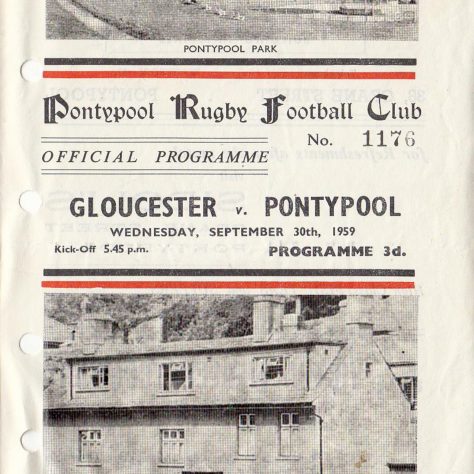
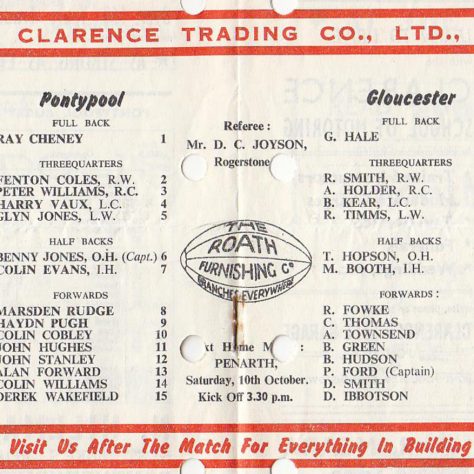
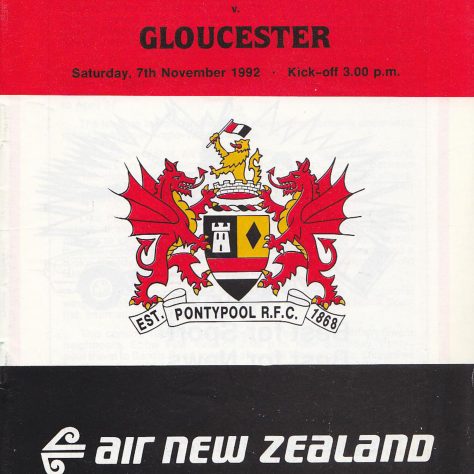
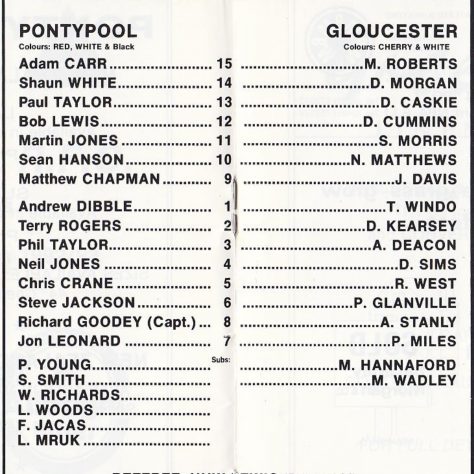
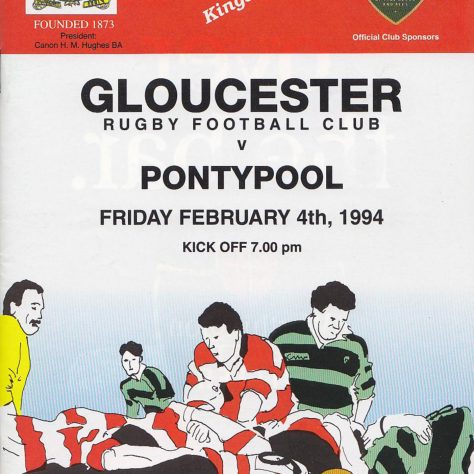
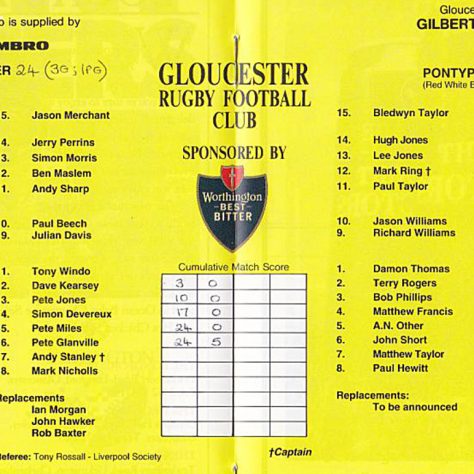




Comments about this page
This article sums up how much of value has been thrown away in UK society …. not just English-Welsh rugby ….. by the worship of money.
The best memories of my life are of being at KIngsholm in the late 1960s – early 1970s.
This article mentions Mickey Booth only once and Dick Smith not at all. John Bayliss is also missing. And many more
All were real men. Giants.
Prop Keith Richardson, who played for Gloucester 1968-77, sent us the following Comment:
“Pontypool was always a highlight for Gloucester. Both teams were hardly at the top of other sides’ wish list but we respected each other and got along pretty well. It was always hard but the anticipated violence (from outsiders) did not materialise. We had a very good track record against Pooler, when teams like Cardiff had lost before they got onto the pitch.
There is a golf society when we swap unlikely tales, but my favourite concerns John Perkins, the Welsh second row. He attacked Steve Boyle’s clenched fist with his head in a dreadful display of aggression – and ended up in the local hospital overnight.
When asked if he had any ill feelings towards Steve, he gave a typically Pontypool response, ‘How could I complain? I had a very firm grip on his crystal set at the time.’
Joe Marler – you were born too late!”
And here’s a great extract from the Gloucester v Pontypool match on 22 Apr 1963:
“Things became somewhat hectic in the loose mauls. Various incidents, culminating in a select, fist-throwing, free-for-all behind the Gloucester line pointed to the fact that Pontypool were a little upset by the beating they were taking . . .”
Chris Collier adds:
I remember that game clearly! Gloucester kicked off, and the ball bobbled over the try-line, but for some reason the Pooler players left it to each other to touch down. Alan Brinn, not the most fleet-footed of players, had been manfully following up, lumbered over the line, and fell on the ball. Gloucester proceeded to score six tries in all, with Alan Brinn scoring a second. Bob Timms scored two, and Gary White another two. White kicked two conversions, and Mickey Booth one, whilst my hero Terry Hopson added two drop goals.
I remember being totally amazed, we just didn’t do this sort of thing to Welsh clubs. I have a clear memory of banging my fists against the back of the Shed to make as much noise as possible. No wonder the Pooler players were just a trifle upset about proceedings.
Phil Pritchard, Gloucester winger 1981-83, recalls that although both clubs had a reputation for taking the game’s regulations “to the limit”, the couple of matches he played against them were on the whole very hard but very fair, probably because each respected the other’s reputations, and there would be little point in each tearing the other apart – which he says they were both capable of.
He also recalls that, having worked a shift at Cheltenham General Hospital one Wednesday, and leaving the ward for Kingsholm at 5:30pm for the 7pm kick-off, he was back on the very same ward by 9pm, lying in a bed beside the patients he had admitted during the day. The following morning, the consultant who was his boss was standing by his bedside enquiring why he was in one of his beds rather than doing the ward round with him. He was told that Phil had snuck off to play for Gloucester when he should have been “on call” for him – although Phil had got one of his mates to cover for him. Having been KO’d during the game, Phil had apparently insisted on being taken to Cheltenham General rather than Gloucester Royal to be checked out, so that at least he would be in the hospital at which he was meant to be working.
Paul Williams, Gloucester Winger 1974-83 tells us that his memories of Pontypool fixtures are of very tough games with good evenings afterwards. He suggests that this might have been due to Jim Jarrett having captained Pontypool for 2 seasons. He says that both clubs were the unfashionable ones in England and Wales and both had a point to prove. Furthermore, Pontypool were the only Welsh club to send Gloucester a good luck message before the 1978 cup final. So relations with Pontypool were very good.
Their old clubhouse at the entrance to the park was full of atmosphere and he enjoyed many a beer in Prosser’s bar.
Paul always remembers they had a full back in the mid-70s who could kick goals with either foot, depending on what side of the pitch he was on. Was his name Robin Williams?
He also recalls going to Pontypool midweek in the mid-70s and winning 18-0. “The team played out of its skin”. This was especially pleasing, as away wins in Wales in midweek we’re hard to come by with a Welsh ref!
(We couldn’t possibly comment on this…)
Add a comment about this page